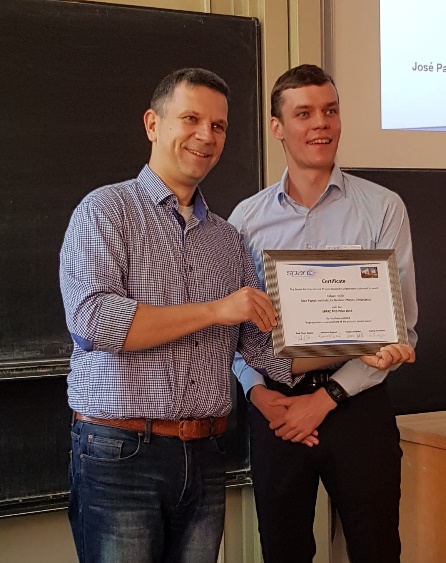Sie sehen momentan nur den öffentlichen Teil des GSI-Kuriers.
Um auch die GSI-internen Artikel angezeigt zu bekommen,
melden sie sich bitte an

Kurier - Mitteilungen von und für Mitarbeitende
Ausgabe: 40-2019 | 30.09. - 06.10.
Nachrichten
Nachrichten
16th SPARC Topical Workshop
Friedrich-Schiller University Jena and Helmholtz Institute Jena,
9th – 13th Sept. 2019
From September 9th to 13th, the SPARC Collaboration held its yearly Topical Workshop and Collaboration Meeting at the Friedrich-Schiller University Jena and the Helmholtz Institute Jena. The particular focus was set on extreme matter research in the realm of atomic physics, astrophysics and at the border to nuclear physics. Close to 120 participants from 14 countries (Austria, China, France, Germany, Greece, Italy, Japan, Poland, Portugal, Romania, Russia, Sweden, UK, USA) participated in the workshop. Recent advances were presented and discussed with emphasis on the FAIR storage rings and ion traps. Examples are the construction of the SPARC experiments and the substantial progress in theory provided in particular by the colleagues from St. Petersburg supported by important contributions from HU Berlin, TU Braunschweig and HI Jena.

Quelle: Lea Wunderlich
Impressive progress was reported on the construction of novel instrumentation getting available, such as substantially improved internal targets for storage rings, cryogenic detectors for precision x- and g- spectroscopy, as well as for non-destructive beam diagnostics and 2D position sensitive particle detectors. Moreover, the workshop provided an overview on the most recent developments and highlights in realm of extreme matter research in the landscape of international facilities with progress reports form CERN (pbar research), JPARC (muonic atoms) and the HIBEF facility at XFEL (vacuum birefringences) where members of the SPARC collaboration are involved. Also the proposal of an g- factory at LHC has been presented.
Particular emphasis was given to the ongoing preparation of experiments in the framework of FAIR Phase-0 at the GSI/FAIR storage rings ESR and CRYRING as well as at the trapping facility HITRAP. For SPARC experiments, in total more than 60 days of beamtime were granted by the GPAC in September 2017 and the collaboration eagerly awaits the technical readiness of the rings for the upcoming beamtime in 2020 to perform these very first challenging experiments after many years of interruption of their exciting but demanding experimental program.
Obviously, the current commissioning of the storage rings at GSI/FAIR has triggered a new dynamics and excitement inside the community. Examples are the CARME experiment (Edinburgh) for the exploration of nuclear astrophysics, the FISIC experiment (Sorbonne University, Paris and GANIL) for the investigation of up to now inaccessible ion-ion collision studies involving high-Z ions and the development of a new type of crystal spectrometer for high resolution observation of photons from the electron cooler (Kielce/Cracow groups). All projects are foreseen to be installed at CRYRING, underlining the unique research opportunities of this very first FAIR research infrastructure (CRYRING is an in-kind contribution of Sweden for SPARC experiments at FAIR).

Quelle: Thomas Stöhlker
A highlight of the workshop was the SPARC PhD award ceremony. Numerous, very high-level nominations had to be evaluated but finally, the clear winner of the award is Fabian Heiße from the Max-Planck Institute for Nuclear Physics at Heidelberg, Germany for his outstanding work at the LIONTRAP (Light Ion Trap) experiment, which focuses on high-precision mass measurements on light ions. Fabian Heiße has measured the proton mass, a fundamental constant in physics, compared to the carbon mass (C6+) with an unprecedented accuracy of 32 parts per trillion. One important future application of his experimental developments are determinations of atomic binding energies of heavy highly charged ions by measurements of the cyclotron frequencies of single ions of one element in different charge states such as highly-charged uranium in which is a central topic of the physics program of the SPARC Collaboration.
The excellent local organization, the warm welcome at the Friedrich-Schiller University and Helmholtz Institute Jena, the enthusiastic introduction to the current status of FAIR provided by Paolo Giubellino and the special location contributed to the full success of this meeting.
In the name of the SPARC collaboration, we thank all participants, the hosts and the financial support (EMMI, HI Jena, AP@GSI) which contributed to the success of this meeting. The 17th annual topical SPARC meeting will take place Sept. 11th - 15th 2020 in Matsue, Japan just after the HCI conference.
On behalf of the organizers,
Angela Bräuning-Demian, Alexander Gumberidze, Christoph Hahn, Lea Wunderlich, Reinhold Schuch and Thomas Stöhlker
Abteilung Atomphysik
Die aktuellen internen Stellenausschreibungen finden Sie auch unter www.gsi.de/jobsintern
Gruppe PER-PAD












